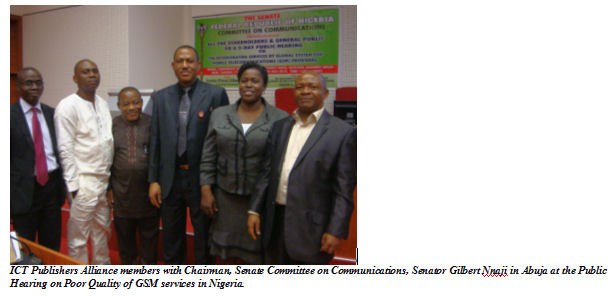ICT Publishers Alliance members with Chairman, Senate Committee on Communications, Senator Gilbert Nnaji in Abuja at the Public Hearing on Poor Quality of GSM services in Nigeria.
ICT Publishers Alliance has urged the Senate to consider an Act that makes telecommunication infrastructure strategic critical national infrastructure. The Alliance made the call in a 24-page paper it presented to the Senate Committee hearing in Abuja, on problems associated with quality of service in mobile phone operations in Nigeria and co-location. In a paper presented by its Chairman, Aaron Ukodie to the Senate hearing, the Alliance said telecom services should be considered as Strategic National Services so as to free it from the debilitating effect of multiple taxation and regulation from various government agencies at the three tiers of government.
According to the Alliance the perception today among different strata of government is that telecom operators are cash-cows therefore should be milked to no end such that taxations at even council levels are notoriously and arbitrarily imposed in such a way as to make continuous or seamless service delivery impossible. This year alone, the NCC has had to intervene in several locations where telecom infrastructures (base stations) have been shut down by council officials enforcing compliance with imposed taxes by local councils, the Alliance said.
“Although cases of multiple regulation and taxation may not be limited to Nigeria alone; our position is that Nigeria can eliminate such cases and become an example to other countries and regions. “It is the responsibility of lawmakers, as the repository of the people’s destinies, to ensure that laws made do not run counter to the needs, desires and social wellbeing of the people they represent”, the Alliance noted.
The Alliance said further that a situation where every agency of government taxes telecom just because they see the industry as the cash-cow, does not and will not augur well for our fledgling telecom industry. “All of a sudden, for instance, every state government, every local government, and every community has become a law maker unto themselves, churning out one law after another nearly every month or quarter of the year, all targeted at milking telecom operators”, according to the Alliance.
The Alliance said that the gazetting of the Quality of Service Regulations by the Federal Ministry of Justice is a right step in the right direction to strengthen the NCC to take some severe measures when service providers are found wanting and that the NCC must also sustain its efforts in the engagement of Drive-Test contractors to carry out continuous quality of service drive-testing in the six geo-political zones and Lagos.
The Alliance said however that while it agrees that the challenges the operators face in delivering good quality service are huge, it believes however that the operators themselves still have a role to play to stem the increasing poor state of telecom services in the country by infusing more resources into expanding the capacity and optimization of their networks.
While aligning itself with the view of the NCC and the International Telecommunication Union (ITU) the Alliance said network optimisation is feasible so as to reduce frequent glitches in operators’ networks. “We are inclined to accept the viewpoint of the regulatory authority that “current mobile network in Nigeria is not fully optimized as the nation can derive more value from an enhanced and optimized mobile network, especially in the area of improved Quality of Service”, the Alliance noted.
PRODUCTS/SOLUTIONS IN FOCUS
Data Sciences adds Cabinet to strengthen document management
Work can only get better through seamless management of information or documents. And mission critical decisions can only be taken in real time if information is easily accessed. That is what Cabinet is bringing to corporate Nigeria.
Cabinet is the electronic document management and security solution added to the portfolio of services in the market by Nigerian premier information technology company, Data Sciences Nigeria Limited. ‘Cabinet’, helps organizations to analyse previous documents, implement new ones and integrate all into a new electronic workflow process.
‘Beginning in the 1980s, a number of vendors began developing software systems to manage paper-based documents. These systems dealt with paper documents, which included not only printed and published documents, but also photographs, prints, etc.
‘Later developers began to write a second type of system which could manage electronic documents, i.e., all those documents, or files, created on computers, and often stored on users’ local file-systems. The earliest electronic document management (EDM) systems managed either proprietary file types, or a limited number of file formats. Many of these systems later [when?] became known as document imaging systems, because they focused on the capture, storage, indexing and retrieval of image file formats. EDM systems evolved to a point where systems could manage any type of file format that could be stored on the network. The applications grew to encompass electronic documents, collaboration tools, security, workflow, and auditing capabilities.
‘These systems enabled an organization to capture faxes and forms, to save copies of the documents as images, and to store the image files in the repository for security and quick retrieval (retrieval made possible because the system handled the extraction of the text from the document in the process of capture, and the text-indexer function provided text-retrieval capabilities).
Cabinet, by Data Sciences Nigeria Limited, stores documents in a secure central location where they can be simplified and streamlined in the work processes leaving staff to focus on core area without time consuming process of retrieving files. Cabinet enables users to capture, manage, share, and protect a wide range of paper and digital content in a central and highly scalable platform.
Though, Cabinet is relatively new in the market, the Executive Director/Head of Sales and Marketing at Data Sciences Nigeria Limited, Mr. Protus Amah stated that Cabinet is meant to service various sectors of the Nigerian economy ranging from government circle to the private and educational sector. Plans are in top gear to get it deployed among Nigerian corporate players and other vital areas of national life. Amah said the company was already talking with the Nigerian Army while companies like Mutual Benefits Assurance Plc had already deployed Cabinet for their document management and information storage.
Cabinet cuts up to 80% of the time it takes to find vital information. It provides easy and secure access to documents from any location 24/7. Though, every business depends on documents, the office environment is speedily transiting to a paperless environment, the days where contracts papers, invoices, budgets, and other key pieces of content are store in office drawers are going gradually, and may never return.
The demand for solutions like the Data Science’s Electronic Document Management and Security solution is increasing because of the value it adds to office operations. It lowers operational costs and helps to meet sustainability goals by reducing paper usage, document storage and disposal. Take for instance, the Corporate Affairs Commission office where over 100 lawyers and other corporate representatives search close to one million incorporated company’s files which are stored in several large file rooms daily. The manual search of physical paper base file will be inadequate to meet the retrieval needs of these customers.
There are also, documents that need to be archived for a long period of time, Electronic Document Management and Security solution will be able to handle the documents in a secure and cost effective way. Documents are business assets and should be controlled as such, with tools that keep them safe.






























